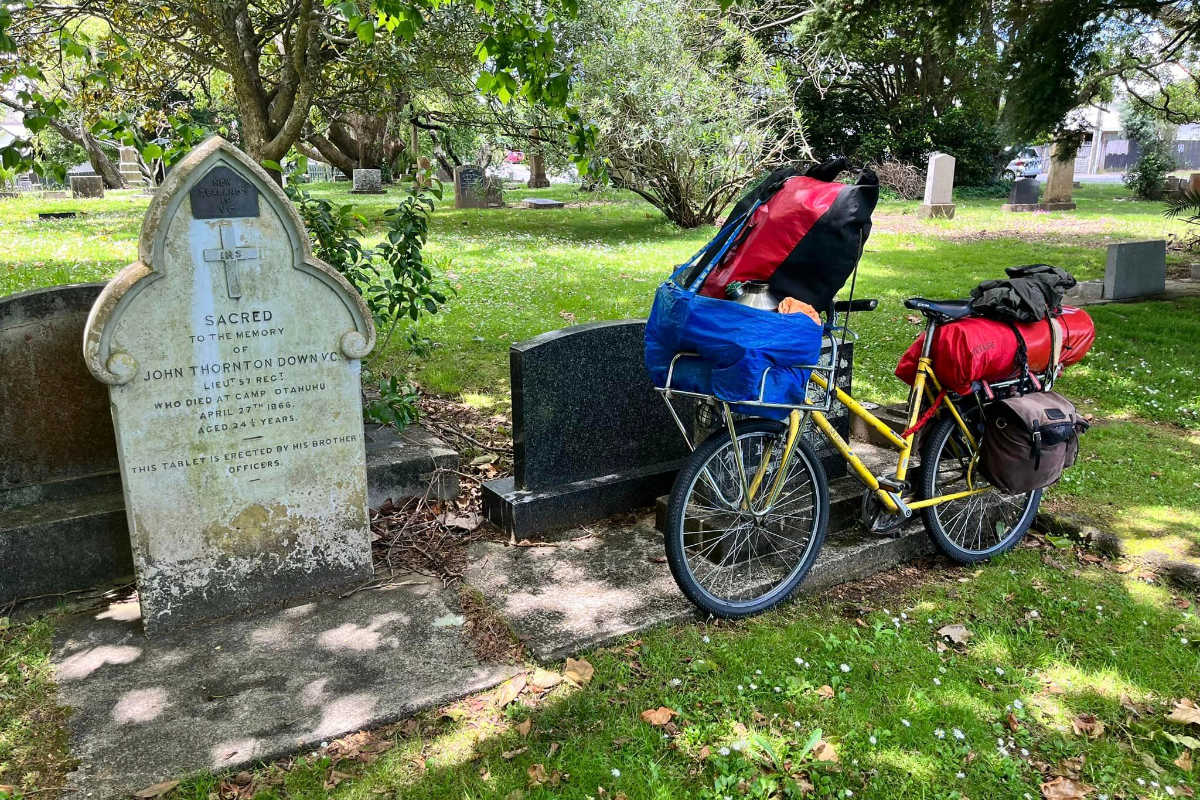Around the world bicycle quest of 30 years and 24,000 cemeteries
Michael ‘Mic’ Whitty is nearly 10 years into a 30-year journey to cycle to every Commonwealth War Graves cemetery in the world, having just passed through South Australia.

After finding his veteran grandfather’s 1916 pocket diary in 2015, Mic borrowed a bicycle and retraced the steps his grandfather had taken through the Western Front nearly 100 years before.
“It’s a bit of a Forrest Gump story in that for a couple of years before setting off… I was homeless and sleeping rough, so it’s not as if I had much else on my plate,” Mic told InDaily.
“It started out being a one-year project, to retrace his footsteps in the centenary year through the Western Front.”
After initially planning on following his grandfather’s footsteps chronologically, Mic discovered the veteran had spent some time in Egypt. But with no way to get there, he decided to substitute this with a three-month cycle to Gallipoli.
“I’d told enough of my friends that this is what I’m going to do, then when I found out he was in Alexandria in Egypt for the first three months I didn’t feel as if I could back out,” he said.

After cycling from Ambleside in the Lake District of Cumbria, England to ANZAC Cove in Gallipoli, Mic found a brochure from the Commonwealth War Graves Commission with a map of all 33 cemeteries along the Gallipoli Peninsula.
He cycled to all 33, but was not done yet.
You might like
“By that point I’d worked out that if I followed the diary chronologically, I’d just be in the one village for months at a time, because the frontline didn’t move.
“By the time I got back to France, I was thinking well, instead of just being in the one village for months at a time… why don’t I visit all the World War One Commonwealth Cemeteries on the Western Front?”
Mic set off to visit the approximately 450 cemeteries in the area, aiming to see them all in one year.
“It got towards the end of the year, and I hadn’t finished, so I thought, well I’ve got nothing much else better to do, why don’t I just move the goalpost out to the end of the centenary of the First World War?”
Alongside this extension of time, Mic increased his goal to cycle to every World War One Commonwealth cemetery in France, Belgium, the Netherlands and Germany – around 2000 cemeteries.
Getting to the end of 2018, Mic had again fallen just short of his goal, but with “nothing else better to do”, decided to set himself a new goal, which he has been working on ever since.
“There are 24,486 cemeteries in the world that have got a Commonwealth World War One or World War Two soldier in them, so I hope to visit them all,” he said.
“I will finish in Bristol Cathedral in the UK on VJ Day, Victory over Japan, 2045, which is the end of the centenary of the Second World War.”

Last year Mic visited 12 cemeteries in Bermuda and cycled through New England on a six month, 8870 kilometre US journey, before heading to New Zealand in time for Christmas.
Stay informed, daily
He began his Australian travels in January, having so far visited around 3700 cemeteries around the globe.
As he visits Australian cemeteries, Mic takes photos of headstones for Australia’s Virtual War Memorial, based in Adelaide.
His travels are funded through a mix of donations and income from presentations along the way.
At 58, Mic said he plans to do the “harder” countries like Africa in his 60s and leave the cemeteries in England until his mid 70s.
Mic says he will be 80 when his planned itinerary winds up in 2045.
Though his schedule is tight, Mic said he finds time to enjoy the entire journey, admitting the cemeteries themselves were more of an extra on the side of his travels.
“It just gives the trip structure – it’s nothing particular about the cemeteries, it’s just like people climb the seven highest peaks on each continent or whatever,” he said.
“I get up each day, I’ve got a rough idea of where I need to be… it’s like Parkinson’s law of economics: The time taken for a task is equal to the time allocated.
“It’s just a very long holiday.”
Mic said he was “very used to” his own company, but with friends around Australia he alternates between “intense weeks of catching up with old friends” and long stretches of travelling alone.
“People come and chat,” he said.
“It’s always a conversation – how far are you going? And I always give people the option… the short answer is, in this case Melbourne, but the long answer is Bristol in another 22 years,” he said.

Although he will have been cycling alone for 30 years by the time he achieves his goal, the daunting trip ahead is not deterring Mic.
“For the couple years I was homeless, the most depressing bit was… this is just endless monotony,” he said.
“My lifespan is no different than what everyone else aspires to. Everyone hopes to live to 80 or 100. I hope to live to 80 or 100 but this is how I happen to be doing it.
“It’s a vocation instead of just an existence.”









